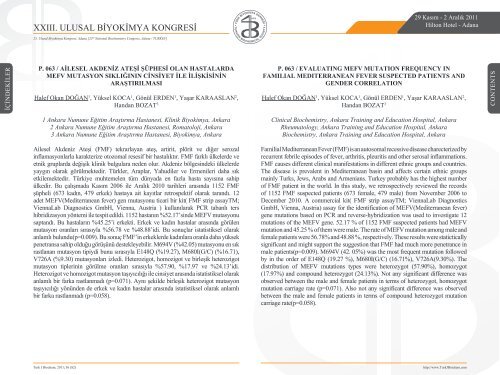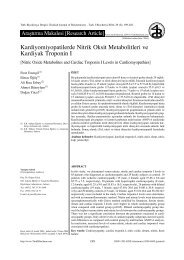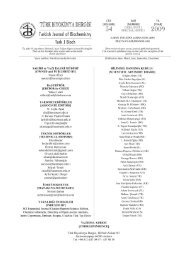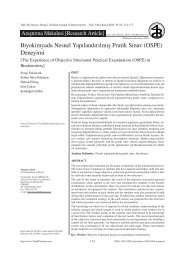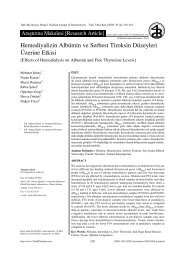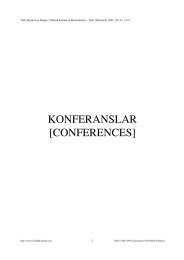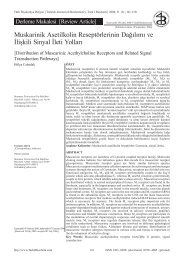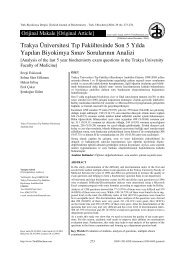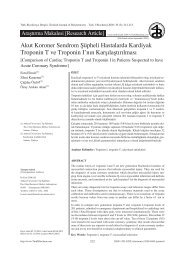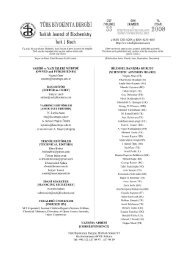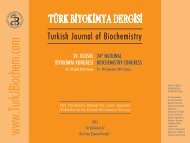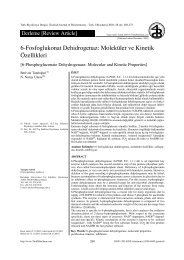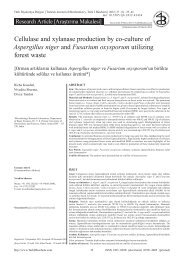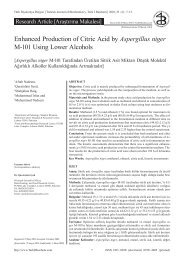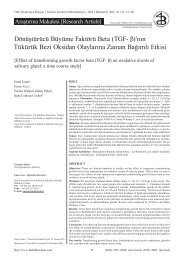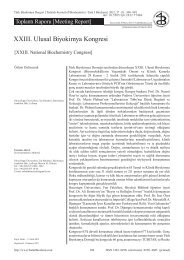23. Ulusal Biyokimya Kongresi Ãzel Sayısı - Türk Biyokimya Dergisi
23. Ulusal Biyokimya Kongresi Ãzel Sayısı - Türk Biyokimya Dergisi
23. Ulusal Biyokimya Kongresi Ãzel Sayısı - Türk Biyokimya Dergisi
You also want an ePaper? Increase the reach of your titles
YUMPU automatically turns print PDFs into web optimized ePapers that Google loves.
XXIII. ULUSAL B‹YOK‹MYA KONGRES‹<br />
29 Kasım - 2 Aralık 2011<br />
Hilton Hotel - Adana<br />
<strong>23.</strong> <strong>Ulusal</strong> <strong>Biyokimya</strong> <strong>Kongresi</strong>, Adana [23 rd National Biochemistry Congress, Adana / TURKEY]<br />
İÇİNDEKİLER<br />
P. 063 / AİLESEL AKDENİZ ATEŞİ ŞÜPHESİ OLAN HASTALARDA<br />
MEFV MUTASYON SIKLIĞININ CİNSİYET İLE İLİŞKİSİNİN<br />
ARAŞTIRILMASI<br />
Halef Okan DOĞAN 1 , Yüksel KOCA 1 , Gönül ERDEN 1 , Yaşar KARAASLAN 2 ,<br />
Handan BOZAT 3<br />
P. 063 / EVALUATING MEFV MUTATION FREQUENCY IN<br />
FAMILIAL MEDITERRANEAN FEVER SUSPECTED PATIENTS AND<br />
GENDER CORRELATION<br />
Halef Okan DOĞAN 1 , Yüksel KOCA 1 , Gönül ERDEN 1 , Yaşar KARAASLAN 2 ,<br />
Handan BOZAT 3<br />
CONTENTS<br />
1 Ankara Numune Eğitim Araştırma Hastanesi, Klinik <strong>Biyokimya</strong>, Ankara<br />
2 Ankara Numune Eğitim Araştırma Hastanesi, Romatoloji, Ankara<br />
3 Ankara Numune Eğitim Araştırma Hastanesi, <strong>Biyokimya</strong>, Ankara<br />
Clinical Biochemistry, Ankara Training and Education Hospital, Ankara<br />
Rheumatology, Ankara Training and Education Hospital, Ankara<br />
Biochemistry, Ankara Training and Education Hospital, Ankara<br />
Ailesel Akdeniz Ateşi (FMF) tekrarlayan ateş, artirit, plörit ve diğer serozal<br />
inflamasyonlarla karakterize otozomal resesif bir hastalıktır. FMF farklı ülkelerde ve<br />
etnik gruplarda değişik klinik bulgulara neden olur. Akdeniz bölgesindeki ülkelerde<br />
yaygın olarak görülmektedir. Türkler, Araplar, Yahudiler ve Ermenileri daha sık<br />
etkilemektedir. Türkiye muhtemelen tüm dünyada en fazla hasta sayısına sahip<br />
ülkedir. Bu çalışmada Kasım 2006 ile Aralık 2010 tarihleri arasında 1152 FMF<br />
şüpheli (673 kadın, 479 erkek) hastaya ait kayıtlar retrospektif olarak tarandı. 12<br />
adet MEFV(Mediterranean fever) gen mutasyonu ticari bir kit( FMF strip assayTM;<br />
ViennaLab Diagnostics GmbH, Vienna, Austria ) kullanılarak PCR tabanlı ters<br />
hibridizasyon yöntemi ile tespit edildi. 1152 hastanın %52.17’sinde MEFV mutasyonu<br />
saptandı. Bu hastaların %45.25’i erkekti. Erkek ve kadın hastalar arasında görülen<br />
mutasyon oranları sırasıyla %56.78 ve %48.88’idi. Bu sonuçlar istatistiksel olarak<br />
anlamlı bulundu(p=0.009). Bu sonuç FMF’in erkeklerde kadınlara oranla daha yüksek<br />
penetransa sahip olduğu görüşünü destekleyebilir. M694V (%42.05) mutasyonu en sık<br />
rastlanan mutasyon tipiydi bunu sırasıyla E148Q (%19.27), M680I(G/C) (%16.71),<br />
V726A (%9.30) mutasyonları izledi. Heterozigot, homozigot ve birleşik heterozigot<br />
mutasyon tiplerinin görülme oranları sırasıyla %57.90, %17.97 ve %24.13’idi.<br />
Heterozigot ve homozigot mutasyon taşıyıcılığı ile cinsiyet arasında istatistiksel olarak<br />
anlamlı bir farka rastlanmadı (p=0.071). Aynı şekilde birleşik heterozigot mutasyon<br />
taşıyıcılığı yönünden de erkek ve kadın hastalar arasında istatistiksel olarak anlamlı<br />
bir farka rastlanmadı (p=0.058).<br />
Familial Mediterranean Fever (FMF) is an autosomal recessive disease charecterized by<br />
recurrent febrile episodes of fever, arthritis, pleuritis and other serosal inflammations.<br />
FMF causes different clinical manifestations in different ethnic groups and countries.<br />
The disease is prevalent in Mediterranean basin and affects certain ethnic groups<br />
mainly Turks, Jews, Arabs and Armenians. Turkey probably has the highest number<br />
of FMF patient in the world. In this study, we retrospectively reviewed the records<br />
of 1152 FMF suspected patients (673 female, 479 male) from November 2006 to<br />
December 2010. A commercial kit( FMF strip assayTM; ViennaLab Diagnostics<br />
GmbH, Vienna, Austria) assay for the identification of MEFV(Mediterranean fever)<br />
gene mutations based on PCR and reverse-hybridization was used to investigate 12<br />
mutations of the MEFV gene. 52.17 % of 1152 FMF suspected patients had MEFV<br />
mutation and 45.25 % of them were male. The rate of MEFV mutation among male and<br />
female patients were 56.78% and 48.88 %, respectively. These results were statictically<br />
significant and might support the suggestion that FMF had much more penetrance in<br />
male patients(p=0.009). M694V (42. 05%) was the most frequent mutation followed<br />
by in the order of E148Q (19.27 %), M680I(G/C) (16.71%), V726A(9.30%). The<br />
distribution of MEFV mutations types were heterozygot (57.90%), homozygot<br />
(17.97%) and compound heterozygot (24.13%). Not any significant difference was<br />
observed between the male and female patients in terms of heterozygot, homozygot<br />
mutation carriage rate (p=0.071). Also not any significant difference was observed<br />
between the male and female patients in terms of compound heterozygot mutation<br />
carriage rate(p=0.058).<br />
Turk J Biochem, 2011; 36 (S2)<br />
http://www.TurkJBiochem.com


